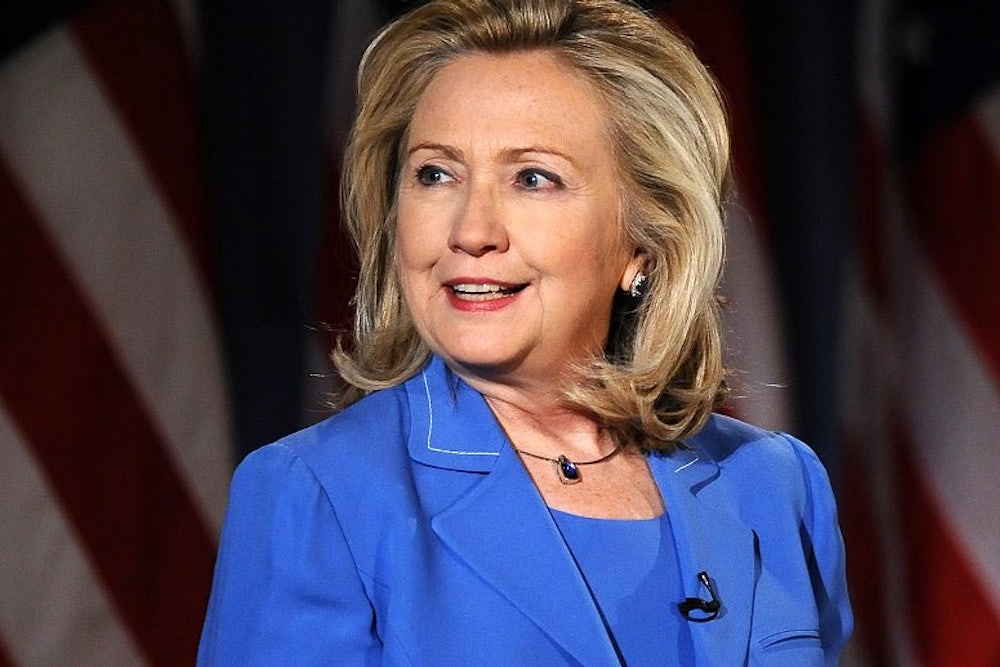The revelation that Hillary Clinton used a home email system while she was Secretary of State—which allowed her to permanently erase messages—has sent the chattering classes of Washington into a frenzy. “There is a widespread feeling, among political professionals and the commentariat, that Clinton, having chosen to delay the launch of her campaign, might be on the point of losing control of its narrative,” wrote the New Yorker’s John Cassidy. Bill Scher, writing at Politico, and Emma Roller, writing at National Journal, mused about what would happen to the Democratic Party if Clinton drops out. Spoiler: It’s not good.
These are all reasonable arguments. Still, we have to keep things in perspective: Clinton is having a tough month and needs to put together a better communications strategy, preferably one that actually involves her talking to the press. Even so, she’s not going to lose the primary and will be a very formidable candidate in the general election.
The Democratic Party’s biggest concern should not be that Clinton used a home email system for official State Department business. It should be that they don’t know what else is out there—the "unknown unknowns," as former Defense Secretary Donald Rumsfield famously said. That’s why, on Wednesday, I argued that Senator Elizabeth Warren should consider a presidential run. Clinton needs a legitimate opponent to pressure her and prepare her for the stakes of the general election. She’s only recently employed researchers to dig through her life over the past six years to find any easy avenues of attack—much too late, in the minds of many Democratic operatives.
If they find major political vulnerabilities—say, for example, she used her private emails to actually hide corrupt actions—then Clinton has big problems ahead. The use of a private email alone, however, will not bring her down and won’t open any space for a primary challenger. Real Clear Politics currently puts her an average of 44 points up on both Warren and Vice President Joe Biden. Recent surveys do not yet reflect people’s opinions of Clinton after this flare up; moreover, polls this early are generally based on name recognition, I know. But Clinton is still dominant. At the same time in the 2008 cycle, Clinton had just a 10-15 point lead on then-Senator Barack Obama. In some polls, she was ahead by just a few points.
Clinton also has a massive fundraising base, while Warren and Biden have shown little inclination to run for president. In other words, barring a major scandal, Clinton will be the Democratic presidential nominee unless she forgoes a presidential run.
Her chances in the general election are, of course, far harder to estimate at this point. The 2016 presidential election is still more than 600 days away. A lot will happen between now and then. Clinton will probably face more negative stories from her time at State. She’ll make some gaffes but Republican candidates will probably make more, if only because there are more of them.
In politics, voters’ memories are short. When Republicans shut down the government in 2013, it sent the GOP’s approval ratings plunging downwards. Pundits immediately began wondering if Republicans had put their stranglehold on the House majority at risk. But only a few months later their approval ratings bounced back, and they destroyed the Democrats in the midterms. Clinton’s home email system will fade from people’s memory in the same way, particularly if she makes all of the emails public. If her approval ratings dip in the coming weeks, as I expect they will, they will likely bounce back as her campaign officially gets underway, reportedly in April.
More importantly, political science has repeatedly shown that the economy plays an outsized role in presidential elections. In December, I argued that the improving economy made Clinton the favorite for 2016. Sean Trende, writing in response at Real Clear Politics, swiftly dismantled my argument. He used Alan Abramowitz’s “time for change” forecasting model to show that even if the economy grew at a 4 percent rate in the second quarter of 2016 and President Barack Obama’s net approval ratings improved to zero (they were -10.8 at the time), Democrats were still projected to lose by a point. At the time, an 11 point improvement in Obama’s approval rating seemed unlikely. But it’s improved in recent months, while the economic recovery has continued to pick up speed (although 4 percent growth is still unlikely). That puts Clinton, according to the fundamentals, in better shape now than she was in December.
This is just one model, of course. Others may tell a slightly different story. But Trende’s conclusion still holds. “Regardless, these models probably can give us a rough sense of what would happen under various fundamentals for 2016,” he wrote. “They point to a reasonably close election; they do not suggest that the Democratic nominee should be considered the favorite at this point.”
In one sense, the reaction to her private email system could actually help Hillary. She’s been biding her time, giving huge-money speeches and is seemingly unconcerned about the Democratic primary. This is a wakeup call. Responding on Twitter is no longer good enough—the 2016 election cycle is in full swing.
— Hillary Clinton (@HillaryClinton) March 5, 2015